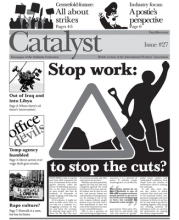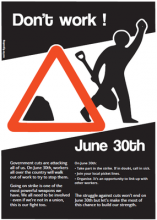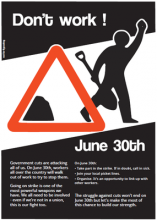Catalyst #27 out now!
Stop work to stop the cuts? Why striking against the cuts makes sense on June 30 and beyond.
Striking back: In-depth centrefold feature on strike action, including an illustrated timeline of strikes in Britain and a graph plotting falling strike days against rising inequality.
Victory against Office Angels: Direct action solidarity wins a temp's stolen wages.
This year's war: From Iraq to Libya - where there's oil there's 'humanitarian intervention'.
Plus: Your basic rights at work, Stokes Croft after the riots and your letters on the Southern Cross healthcare debacle, Slutwalks and more!
Due to popular demand, the pdf download is now as single pages (no spreads), so it can be printed out legibly on a normal A4 printer.






